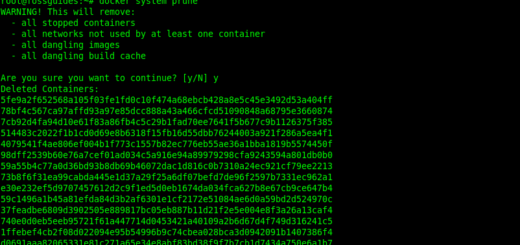Here are the Most Commonly Used Linux Server Operating Systems
Because of its reliability, security, flexibility, and low cost, Linux is a popular server operating system. Linux operating systems are open-source and may be tailored to meet the unique requirements of a server environment.
Page Contents
This article reviews the most popular Linux server operating systems, each with its own set of features and advantages.
1. Ubuntu Server
Ubuntu Server is a popular Linux-based operating system for servers and cloud computing. It is based on the open-source Debian distribution and is supported by Canonical Ltd., a UK-based company.
The first advantage that Ubuntu Server provides to consumers is that it is free and open-source. Ubuntu Server is accessible for free download and use, and its source code is open for anybody to alter and share. Ubuntu is similarly simple to use. Ubuntu Server includes a user-friendly interface and a variety of pre-installed software packages, making it simple to get started with server administration.
Importantly, the Ubuntu server includes a plethora of security features. Ubuntu Server is well-known for its robust security measures, which include a built-in firewall, encryption tools, and monthly security upgrades.
It is a popular option for cloud computing since numerous cloud services support Ubuntu servers. It is available on cloud platforms such as Amazon Web Services (AWS), Microsoft Azure, Google Cloud Platform (GCP), Akamai/Linode, Digital Oceans, Vultr, and more.
In terms of support, Ubuntu Server has a huge and active community of users and developers that assist debug issues and give support. Furthermore, Canonical Enterprise Support is intended to provide businesses and organizations with the technical support and resources they require to effectively manage their Ubuntu environment(s). Customers may guarantee that their Ubuntu servers are safe, dependable, and optimized for their unique needs by subscribing to this service.
Download the Ubuntu server from: https://ubuntu.com/download/server
2. Debian
Debian is a Linux distribution that is available for free and open-source, and it is commonly used as a server operating system. It is well-known for its stability, security, and big software package repository. Many web hosting providers use it because it is a popular choice for servers that require long-term support.
The Debian server may be used for a variety of tasks, including hosting websites, email servers, file servers, and database servers. System administrators frequently favor Debian because of its package management system, which allows for simple installation, update, and removal of software packages.
It’s also well-known for its strong security features, including as regular security updates and the usage of the AppArmor security framework. Debian is a community-driven project, therefore it is regularly improved and updated by a wide global community of developers and users.
Download the Debian server from: https://www.debian.org/CD/http-ftp/#stable
3. Red Hat Enterprise Linux (RHEL)
Red Hat Enterprise Linux (RHEL) is a prominent commercial Linux distribution used by enterprises and organizations throughout the world. It is meant to provide a safe, secure, and dependable platform for enterprise-level applications and is developed and maintained by Red Hat, Inc.
RHEL is a Linux distribution that is based on the open-source Fedora distribution and is well-known for its reliability, security, and long-term maintenance. It is utilized in many fields, including banking, healthcare, government, and education.
RHEL is offered in three editions: Desktop for individual users, server for data centers and cloud infrastructure, and workstation for technical computing and development. It also comes with a number of tools and features, including system management tools, high availability choices, and security measures such as SELinux.
RHEL is a trustworthy and stable platform for enterprises and organizations that demand a safe and scalable operating system, thanks to Red Hat’s frequent upgrades and long-term support.
Download the RHEL server from here: https://www.redhat.com/en/technologies/linux-platforms/enterprise-linux
4. Fedora Server
Fedora Server is a Linux distribution intended for use as a server operating system. It is maintained by the Fedora Project, a community-driven project supported by Red Hat. Fedora Server is free and open-source software that contains a wide range of server-oriented features and capabilities.
Fedora Server is intended to be a lightweight operating system that uses little system resources, making it suitable for usage in virtualized settings and cloud deployments. Furthermore, Fedora Server employs a modular approach that enables administrators to select the software packages and services they require while avoiding unnecessary bloat and complexity.
Furthermore, Fedora Server includes a number of security features to help protect against security threats, such as SELinux (Security-Enhanced Linux) and firewalld. Fedora Server also includes a variety of management tools that make it simple to configure and maintain the system, such as Cockpit, a web-based system administration interface.
Download Fedora Server from here: https://fedoraproject.org/server/
5. SUSE Linux Enterprise Server (SLES)
SUSE Linux Enterprise Server (SLES) is a Linux-based operating system intended for servers, mainframes, and other high-end computers. SUSE, a German-based software business that delivers corporate Linux solutions, created it.
SLES has several characteristics that make it suited for mission-critical applications. It has high availability clustering, built-in security measures, and compatibility with a wide range of hardware and software platforms. SLES also contains software management and deployment capabilities, as well as a comprehensive set of development tools.
SLES’s Long Term Support (LTS) cycle, which provides extended support and maintenance for up to 13 years, is one of its distinguishing features. This makes it an excellent solution for businesses that want robust and dependable platforms for essential workloads.
SLES is available in several editions, including conventional and high-performance computing (HPC). It also supports a wide range of architectures, such as x86, IBM Power Systems, and IBM Z mainframes.
Download SUSE Linux Enterprise Server from here: https://www.suse.com/download/sles/
6. Oracle Linux
Oracle Linux is a business-class Linux distribution created and maintained by Oracle Corporation. It is Red Hat Enterprise Linux (RHEL)-based and completely compatible with RHEL packages and repositories.
Oracle Linux provides a dependable and secure operating system for business workloads, with features like integrated Ksplice technology for zero-downtime kernel patching, sophisticated security features like SELinux and AppArmor, and support for cutting-edge hardware and software innovations.
Oracle Linux comes in two flavors: Standard Edition and Enterprise Edition. The Standard Edition is available for free download and use, but the Corporate Edition includes extra features and support for corporate workloads.
Oracle Linux also comes with a number of system management tools and technologies, such as Oracle Clusterware for high-availability clustering, Oracle Enterprise Manager for centralized system administration, and Oracle Linux Container Services for Docker for containerization.
Download the Oracle Linux server from here: https://www.oracle.com/linux/
7. Rocky Linux
Rocky Linux is a free and open-source enterprise-grade operating system that was created as a replacement for CentOS. Gregory Kurtzer, a CentOS co-founder, established it when CentOS moved its focus from a stable release to a rolling-release model(called CentOS Stream) following its acquisition by Red Hat.
Rocky Linux intends to provide a stable, secure, and dependable platform for users that demand an enterprise operating system with long-term support. It is intended to be compatible with Red Hat Enterprise Linux (RHEL) and adheres to the same release cycle. This implies that updates and security fixes are delivered concurrently with RHEL.
Rocky Linux is a community-driven project, which means it is created and maintained by volunteers all around the world. It is free to use and share, and its source code is open-source. Rocky Linux may be used for a variety of purposes, including as web servers, databases, and corporate applications.
Download Rocky Linux from here: https://rockylinux.org/download/
8. AlmaLinux
AlmaLinux is a free and open-source enterprise-grade Linux distribution intended to be a drop-in replacement for CentOS, a popular Linux distribution that will be phased out in 2020. AlmaLinux is based on the source code of Red Hat Enterprise Linux (RHEL) and is maintained by the AlmaLinux OS Foundation, a non-profit organization founded by CloudLinux, a cloud hosting firm.
AlmaLinux’s goal is to deliver a stable, dependable, and secure platform for business workloads, as well as long-term support for security upgrades and bug patches. It is compatible with most CentOS 8 packages and provides a familiar environment for CentOS users, making the transfer from CentOS to a supported alternative simple.
AlmaLinux is known for its dedication to transparency and community-driven development. The AlmaLinux OS Foundation is a non-profit corporation supported by community donations and business sponsorships, ensuring that the project stays autonomous and focused on its users’ needs.
AlmaLinux is available in a variety of formats for download, including ISO images for installation on physical servers and virtual machines, as well as cloud images for usage on major cloud platforms such as AWS, Azure, and Google Cloud Platform.
Download AlmaLinux from here: https://almalinux.org/#downloads
Conclusion
These are just a few of the most popular Linux server operating systems. There are plenty more options available, each with its own unique set of features and benefits. Please share your opinions on this story in the comments section.



